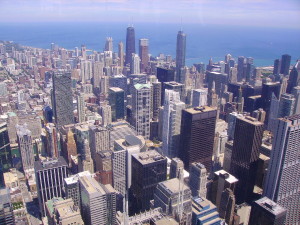In an effort to eradicate crime in the urban city of Chicago, the city officials are demolishing abandoned buildings that are magnets for drug users and drug dealers. The buildings targeted for demolition are known hangouts for gangs and drug dealers. Residents of the neighborhood have been asking Alderman Carrie Austin for years to get the city to take down these buildings. Happily, now, the city is listening to the neighborhood residents.
The Demolition of Buildings in Blighted Neighborhoods
The Chicago Police Department and the Department of Building and Safety have started demolishing the building structures located in the West Pullman neighborhood. Mayor Rahm Emanuel says that these demolitions are necessary to fight gang violence and crime in the area. Chicago has torn down at least 14 structures and boarded up about 400 buildings so far. The structures being targeted for demotion are those that are located in high crime areas, those that have absentee owners and those that have no possibility of being repaired. See abc7news for more on this story.
High Crime in Urban Areas
As a rule, the crime rate in large urban areas such as Chicago is substantially higher than it is in smaller cities and rural areas. There may be several reasons for this; however, the most obvious is “overcrowding” and “economic depression.” Companies will not “open for business” in areas with high crime rates, therefore, there are fewer jobs for the residents in these areas. Fewer jobs will depress the economy, forcing some of those residents to resort to crime. The escalation of crime such as burglary and robbery in these neighborhoods will cause businesses to bypass those areas when they are considering expanding. It is pretty much like the dog chasing its tail. You will not be able to get businesses to open in areas where there is a substantial risk of criminal activities against their business interests.
Neighborhoods labeled as “economically depressed” are also ripe for an increase in other major crimes such as gang activity, drug use and abuse, drug dealing, rapes, assaults, riots, looting, arson, and murders. When the criminal element takes over the neighborhoods, the law abiding residents will either leave, or they will disengage from the neighborhood and will live in fear of any involvement outside of their small circle of friends and family. When crime happens in these neighborhoods, it is very unlike that the law abiding residents still living there will work with law enforcement because the criminals, who may also live in the neighborhoods, are threatening them. The criminal elements adhere to the urban adage that “snitches get stitches,” so the community lives in fear of retaliation if they work with the police in solving neighborhood crime, and the “circle of life” in these types of communities continues.
So far the city managers and the police have not found a way to break this circle. Demolishing old abandoned buildings may help but is it enough.
Rescuing Blighted Neighborhoods From Crime
The rate of major crimes committed in urban Chicago is one of the highest in the nation. Last year in 2015 alone, there were an estimated 2,987 shooting victims, and as of February 2016, there have been 448. (Chicago Tribune) While demolishing abandoned buildings in blighted neighborhoods is a step in the right direction, it appears that much more will have to be done to make these neighborhoods safe, to get businesses to relocate back into the neighborhoods, and to put the residents back to work.
Criminal Defense Attorney David Freidberg
If accused of a crime, it is important that you know what your rights are, and how to protect them. The need for an experienced criminal defense attorney begins with the charge and arrest. Knowing your rights is the first step in the process, and continues thereafter through a possible trial to acquittal or sentencing. So if you are being charged with any crime, including murder, sexual assault or battery, and would like to discuss all of the potential defenses available to you, call the Law Offices of David Freidberg today, at (312) 560-7100, or send an email, for a no-obligation consultation.
 Chicago Criminal Lawyer Blog
Chicago Criminal Lawyer Blog



